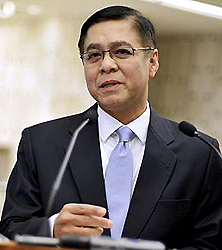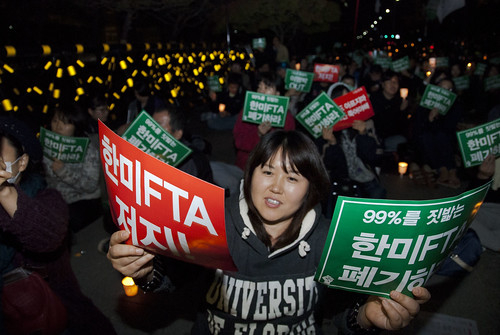China will not use force in Spratlys, says new envoy
Jerry E. Esplanada,
Philippine Daily Inquirer, March 16th, 2012
China does not intend to invade or use its military might to interfere in the affairs of any of its neighbors, including the Philippines and four other countries claiming ownership of the Spratlys in the West Philippine Sea (South China Sea), Beijing’s new ambassador to Manila said Thursday.
“We have no ambition or ability to pose a threat to other countries … What we want to do is to protect China’s interests, protect its borders and sovereignty. That’s all,” Ambassador Ma Keqing told a news conference held Thursday at her residence in Dasmariñas Village, Makati City.
Asked about the US plan to increase its military presence in the region, Ma said “China has responded very calmly” to the issue.
“The Asia-Pacific is wide enough to accommodate (both) the US and China,” she said.
Ma, who assumed her post only two months ago, noted the 11.2-percent increase in China’s military budget this year might have “aroused suspicions” among other countries about its real intentions. She emphasized that China’s military policy was “purely defensive in nature.”
She pointed out that the growth in China’s military budget had been “very minimal” for a long time. “We increased the growth just to compensate for the previous years of neglecting the military budget,” she said.
Ma said the bulk of military expenditures had been used “for logistics, for improvement of the officers’ well-being, to increase wages and so on. It was only in the last few years we used the increase in budget to purchase hardware for the military.”
The military budget was “only 1.3 percent of the total (government) budget,” she stressed, pointing out that it was much lower than that of the United States, United Kingdom, Russia, India and Brazil.
“So with such a military budget, I believe the Chinese Army will not pose any threat to other countries,” she said.
Alarm bells
Early this month, Beijing announced that its defense budget would increase to 670.27 billion yuan (about $106.41 billion) this year. The amount marks a slowdown from 2011 when its budget rose by 12.7 percent but still set off alarm bells across Asia and the United States.
In January, Washington disclosed a defense strategy focused on countering China’s rising power.
In her first news conference in the country, Ma expressed hopes the Philippines and China could “finally find a way to start the negotiations” on the joint development of areas in the West Philippine Sea.
“As Chinese, we are patient. But with patience and wisdom and goodwill, we can finally find a way,” she said. “Our thinking is that pending the final resolution of (the Spratlys dispute), we should shelve and put aside our differences and have a joint cooperation (agreement).”
“The resources are there to tap,” Ma said, adding that economic development “is our priority” for China, the Philippines, Vietnam, Taiwan, Malaysia and Brunei, which are claiming ownership over the Spratlys.
Joint development
“But since it’s in the disputed islands, no one can take action unilaterally. So the proper way to do that, or the starting point is to shelve differences and disputes and have joint cooperation,” she said.
Earlier, Foreign Secretary Albert del Rosario told the Philippine Daily Inquirer that the joint development of areas in the West Philippine Sea that “are clearly ours is not a viable option” to the country’s problem with China. But he said the Philippines “is open to considering joint development in the disputed areas.”
Del Rosario said he “reiterated our position that we are open to inviting China to the Recto Bank (Reed Bank) as an investor to be governed by our laws” during a recent meeting with Wang Yingfan and Wang Chunqui, two former Chinese ambassadors to the Philippines who were here on a goodwill visit.
The Recto Bank is an “integral part of the Philippines and, as such, cannot be jointly developed,” he said.
During the news conference yesterday, Ma said China “is not against the rules-based interpretation of the dispute.”
“We also endorse international norms that we should abide by. But one cannot side only with few clauses of the (UN Convention on the Law of the Sea or Unclos) and neglect other clauses,” she said.
Other treaties
“There are more international norms than (Unclos). Even according to this treaty, we can find some arguments to support China’s stance. There’s a little bit of misunderstanding that China does not abide by international rules and only to historical facts. Unclos is just one treaty. There are other treaties,” she said.
Del Rosario has repeatedly asserted that a rules-based approach is the “only legitimate and viable way to address disputes in the West Philippine Sea.” The Philippines has been pushing for the availment of the dispute settlement mechanisms under Unclos.
No longer Cold War
She expressed hopes the United States “will take a constructive and positive role to make this region more peaceful and stable.”
“We believe and hope that there is a possibility for China and the US to have cooperation in this region rather than confrontation, I like to believe that based on this argument this is not anymore Cold War. We are living in a new world. We are living in a global village, and we are so interdependent,” she said.
At the same time, she expressed optimism that “all countries in this region can develop their economies and improve the well-being of their people.”
“China has its own interests. Being an Asian country, it’s only natural. We hope our interests will be respected by others, including the US, the Philippines and other countries. At the same time, we respect the interests of other countries. In that way, we can have mutual trust and enhanced cooperation. At the end of the day, economic development will determine the development of a nation,” she added.


 “Settlers have developed 40 springs as tourist sites, deploying picnic tables and benches and given them Hebrew names,” one of the
“Settlers have developed 40 springs as tourist sites, deploying picnic tables and benches and given them Hebrew names,” one of the 



 Sihasak Phuangketkeow (Photo AFP)
Sihasak Phuangketkeow (Photo AFP)






